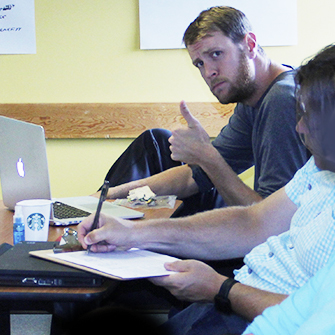Overview
The Graduate Certificate in High Performance Coaching & Technical Leadership (HPC & TL) was designed as a one-year, part-time program that used a blend of online and residential course delivery.
The development of skills in analysis and evidence-based decision-making had been identified as a critical need by national coaches and technical leaders, and this program was created to help develop the next generation of coaches and technical leaders for Canada. The blended model of residential periods and online course delivery provided the flexibility for domestic and international working professionals to participate in this program. The program was integrated into the sport federations’ national coaching qualifications, providing the National Coaching Certification Program (NCCP) together with academic credentials.
Goals
The goal of the program was to provide a strong foundation for current and future coaches and technical leaders by developing knowledge and skills in the interpretation and use of research, balanced with applied coaching practice. This graduate program enhanced the reputation of the School of Kinesiology, and sustains over the long term the presence of the nations’ best students in this field at UBC. The graduate program also provides significant research opportunities in high performance athletics as students and faculty work together to enhance Canadian athletic potential and performance on the international stage. The intention was to design a highly flexible approach to delivery in order to fit with occupational demands, to provide opportunities to transition to a future technical leadership role (similar to the national coaches), and to offer participants the ability to expand on current practice by providing access to world leading research and innovation in high performance sport.
The main goals were to
- Develop coaches with the competence to produce medal performances in international competition at the developmental level.
- Develop technical leaders with the competence to provide strategic and operational leadership of a sport program.
Deliverables
Four “mixed-mode” courses were designed and developed, where online and face-to-face learning were blended, and learners were able to stay within their communities and maintain their work schedule for the majority of course work. The courses were
- KIN 515 – Gap Analysis
- KIN 585 – Coaching Sciences I: Performance Planning
- KIN 586 – Coaching Science II: Coaching Effectiveness
- KIN 598 – Directed Field Studies: Practicum
The coaches were introduced to a number of educational technologies specifically selected to achieve the intended outcomes. These technologies used in these courses included:
- Connect blogs to document learning and solicit feedback from instructors and external mentors.
- Blackboard Collaborate to record presentations and post peer feedback on the discussion forum.
- FluidSurvey to conduct 360-degree assessment survey with peers, mentors, and academic advisors.
- Collaborative Learning Annotation System (CLAS) to annotate videos of recorded coaching sessions, mark the turning points and critical interactions between the coach and the athletes, and solicit further feedback from the mentors.
The program began with a one-week face-to-face component, then the rest of the program took place in the online environment. During the face-to-face portion, ETS provided hands-on orientations for the four technologies. ETS and the instructors also provided online how-to videos on each technology, as well as one-on-one technical support.
Lessons Learned
Within a span of 10 months, the course work required the students to become familiar with one online learning management system and three different softwares. Learning a new software and systems was quite a demanding workload given some of the students were full-time coaches, and technology use was not the focus of their study. At the end of the certificate program, a few coaches indicated in the feedback form that learning Connect and Blackboard Collaborate helped them pick up transferable skills and enhanced their overall learning experience. However, a number of them indicated FluidSurvey and CLAS either had no impact on their learning experience, or even considered them as an extra burden in the learning process. As a result, in the second cohort offering, the technologies were pared down to Connect and Blackboard Collaborate, the essential platforms for students to access course content and record their own presentations. Less-robust technologies, but easier to use, are made mandatory in place of FluidSurvey and CLAS. The two technologies will remain available to the students if they choose to use more advanced tools. Furthermore, UBC Blogs will be used instead of Connect blogs. This is so that the portfolio can remain accessible after graduation, and also because the blogging skills developed from using UBC Blogs (i.e., WordPress) will be more transferable than skills developed from using Connect blogs.
The uniqueness of this online Certificate program was its structure. Other Faculty of Education programs staggered the courses within the program, whereas this program began all four courses at the same time. The instructors carefully coordinated the activities and assignments, so that the workload and introduction to new technologies were evenly distributed. In addition, students had the flexibility to adjust their learning according to their work obligations, and to conduct their field experience practice during the time when the sport they coached was in season.
Although fully online and mostly asynchronous, the students had a number of guest speakers who facilitated live Collaborate sessions or recorded video lectures in a timely fashion to discuss current topics. In this way, the truly Canadian program was enriched with the presence of well-renown experts.
Gallery
Photographs were taken at the HPC Orientation sessions on June 6th and 8th, 2016.
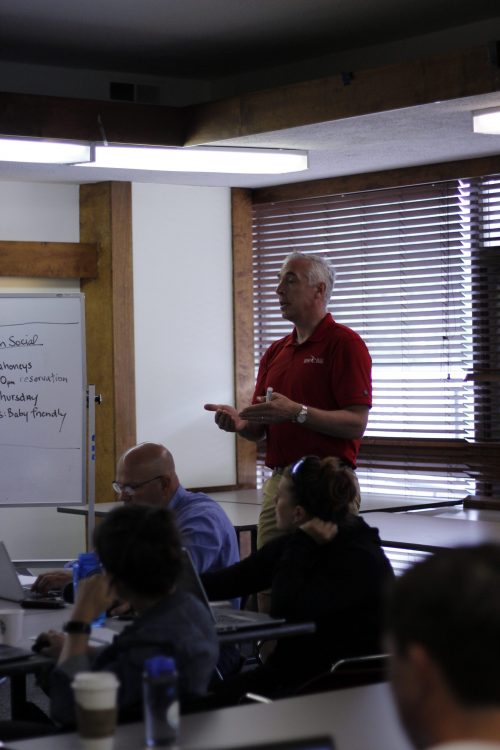
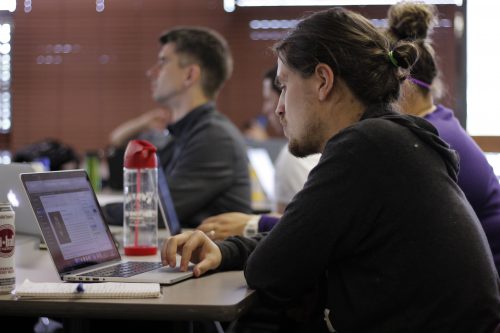
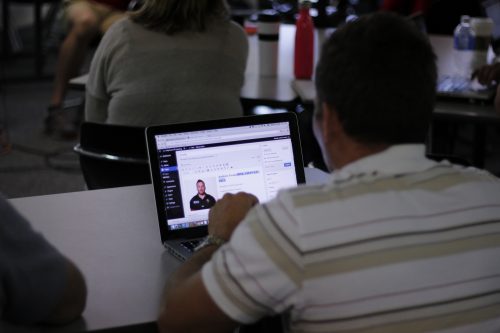
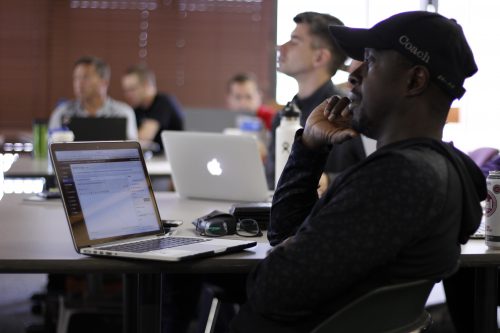
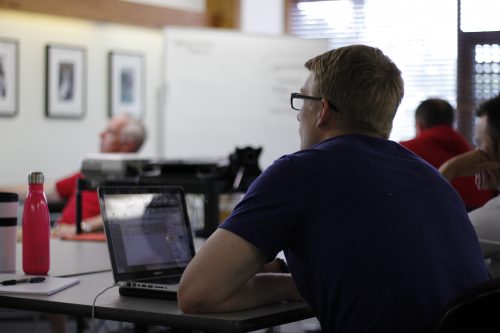
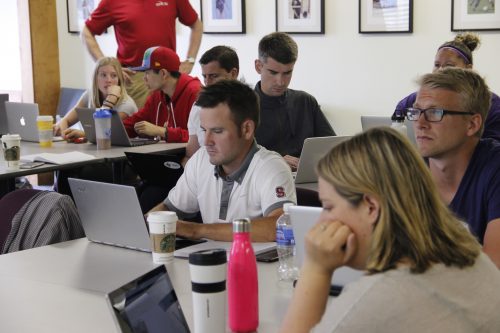
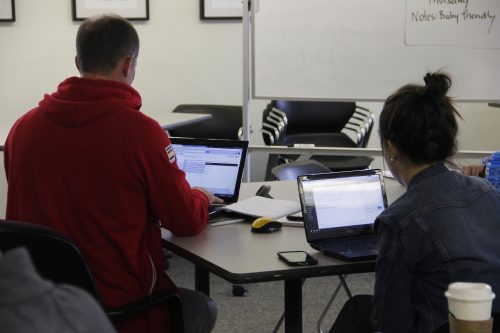
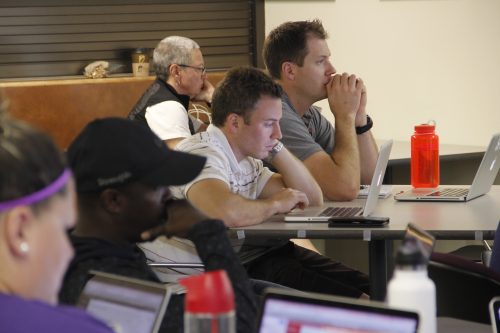
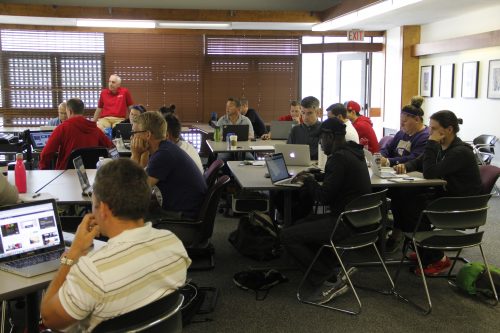
This text will automatically change to the first data-caption value in the list.
Project Team
Course Authorship & Instruction
- Andy Van (KIN 515)
- Maria Gallo (KIN 585)
- Shaunna Taylor (KIN 586)
- David Hill (KIN 598)
Project Management & Instructional Design
Sharon Hu, ETS
Learning Technologies Integration
Ian Linkletter, ETS
Web Programming
Bill Pickard, ETS
